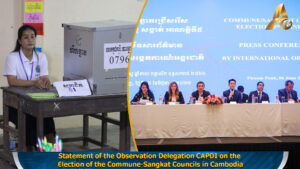China-Cambodia FTA to Take Effect on Jan. 1, 2022
The free trade agreement (FTA) signed between China and Cambodia will take effect on Jan. 1, 2022, according to the Ministry of Commerce (MOC).
The agreement, which was officially signed on Oct. 12, 2020, brings the proportion of zero-tariff products in the goods trade between China and the Southeast Asian nation to more than 90 percent for both countries, the ministry said.
In the document, the two countries agreed to open up to each other as much as possible in the service trade sector.
Meanwhile, the two sides also agreed to deepen cooperation in investment, the Belt and Road Initiative, e-commerce, and economic and technical sectors, according to the MOC.
The FTA is a new milestone in the development of bilateral economic and trade relations, and will help enhance the well-being of enterprises and people of both countries, the MOC said.
The Cambodia-China FTA extends across a wide range of sectors, including trade, tourism, investment, transportation, and agriculture. China will provide duty-free status to some 98 percent of imports from Cambodia whereas Cambodia has agreed to exemptions of up to 90 percent of its imports from China.
Through the CCFTA, Cambodia hopes to increase bilateral trade with China to US$10 billion by 2023, up from $8 billion in 2020. This is a timely development for Cambodia as businesses continue to reel from the European Union’s (EU) withdrawal of the Everything but Arms (EBA) status in 2020.
Through the CCFTA, Cambodia can leverage and better develop its agriculture industry in return for Chinese efficiency in manufacturing or products, such as electronic devices that local producers cannot make.
During the first half, Chinese exports to Cambodia added up to $5.14 billion, up 41.8 percent from a year ago, while its imports from the nation surged 56.9 percent to $970 million, according to the MOC.
Khmer Times







